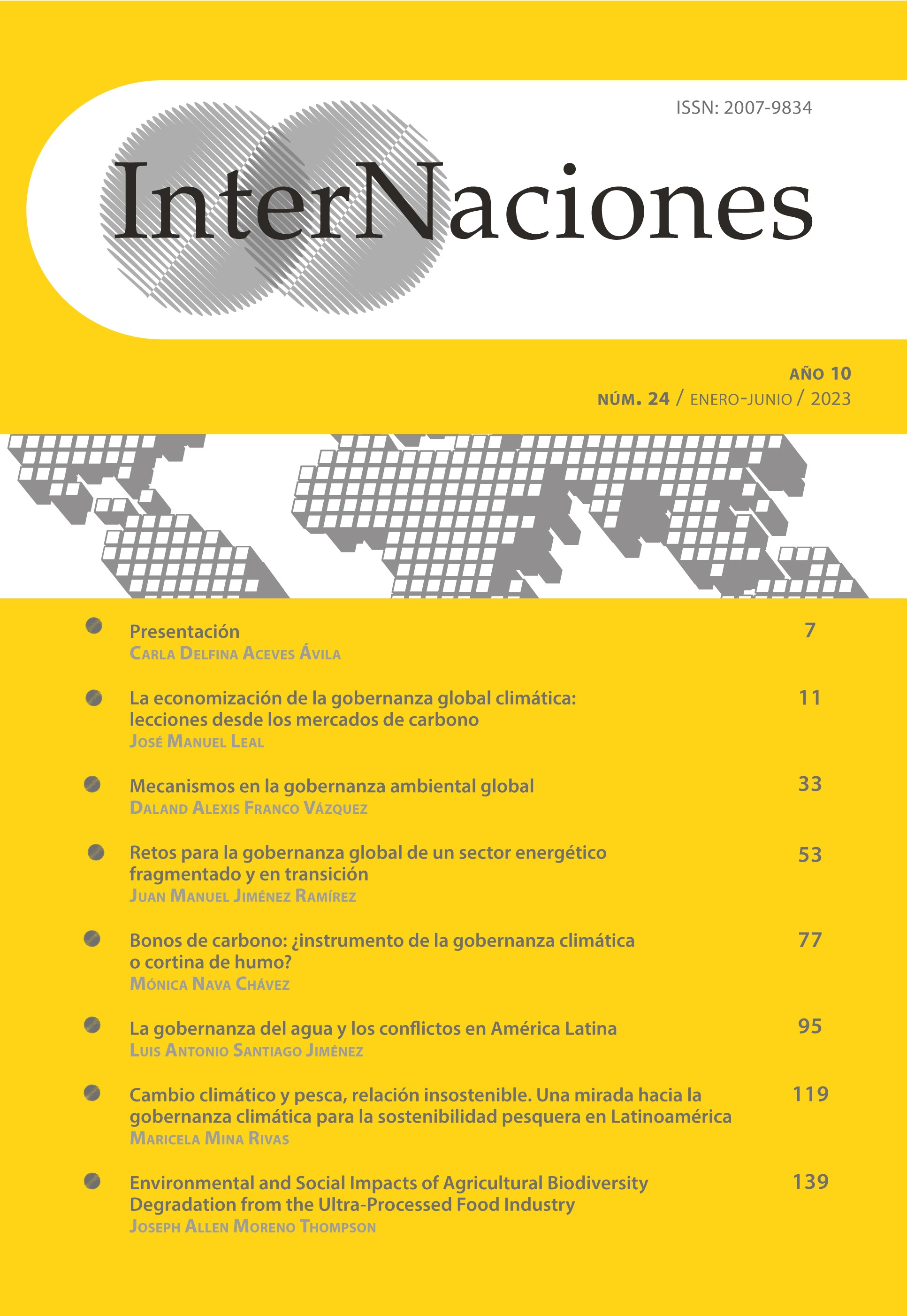La economización de la gobernanza global climática
lecciones desde los mercados de carbono
DOI:
https://doi.org/10.32870/in.vi24.7232Palabras clave:
Gobernanza climática, Mercados de Carbono, Hegemonía, Consentimiento, Política Económica InternacionalResumen
En las últimas décadas, las relaciones internacionales se han visto fuertemente guiadas por la Política Económica Internacional (PEI). El presente artículo pretende ilustrar la influencia que han tenido ésta en la gobernanza global. Utilizando a los mercados de carbono y su influencia en la gobernanza global climática, el artículo ejemplifica el dominio del enfoque de PEI en la política internacional. El artículo pretende mostrar cómo es que la gobernanza climática esta fuertemente influenciada por un enfoque de PEI. A través de un breve repaso de los mercados de carbono, el artículo pretende mostrar cómo la gobernanza global climática esta fuertemente influenciada por la PEI. Empleando la noción de hegemonía de Antonio Gramsci, el artículo aspira contribuir a un mejor entendimiento de cómo es que las políticas climáticas siguen una lógica económica.Descargas
Citas
Bernstein, S. (2001). The Compromise of Liberal Environmentalism. Columbia University Press. http://www.degruyter.com/view/books/bern12036/bern12036/bern12036.xml
Bernstein, S., Betsill, M., Hoffmann, M., & Paterson, M. (2010). A Tale of Two Copenhagens: Carbon Markets and Climate Governance. Millennium: Journal of International Studies, 39(1), 161–173. https://doi.org/10.1177/0305829810372480
Betsill, M., & Bulkeley, H. (2004). Transnational Networks and Global Environmental Governance: The Cities for Climate Protection Program. International Studies Quarterly, 48(2), 471–493.
Betsill, M., & Bulkeley, H. (2006). Cities and the multilevel governance of global climate change. Global Governance: A Review of Multilateralism and International Organizations, 12(2), 141–159.
Bulkeley, H., Andonova, L., Bäckstrand, K., Betsill, M., Compagnon, D., Duffy, R., Kolk, A., Hoffmann, M., Levy, D., Newell, P., Milledge, T., Paterson, M., Pattberg, P., & VanDeveer, S. (2012). Governing Climate Change Transnationally: Assessing the Evidence from a Database of Sixty Initiatives. Environment and Planning C: Government and Policy, 30(4), 591–612.
Bulkeley, H., Andonova, L., Betsill, M., Compagnon, D., Hale, T., Hoffmann, M. J., Newell, P., Paterson, M., Roger, C., & Vandeveer, S. D. (2014). Transnational climate change governance. Cambridge University Press.
Bulkeley, H., & Newell, P. (2015). Governing climate change. Routledge.
Burton, J. W. (1972). World society. University Press.
Cao, X., & Ward, H. (2017). Transnational Climate Governance Networks and Domestic Regulatory Action. International Interactions, 43(1), 76–102.
Cardoso, F. H., & Faletto, E. (1979). Dependency and development in Latin America (Dependencia y desarrollo en América Latina, engl.). Univ of California Press.
Carroll, W. K. (2010). The making of a transnational capitalist class: Corporate power in the twenty-first century. Zed.
Chan, S., van Asselt, H., Hale, T., Abbott, K. W., Beisheim, M., Hoffmann, M., Guy, B., Höhne, N., Hsu, A., Pattberg, P., Pauw, P., Ramstein, C., & Widerberg, O. (2015). Reinvigorating International Climate Policy: A Comprehensive Framework for Effective Nonstate Action. Global Policy, 6(4), 466–473.
Clapp, J. (1998). The Privatization of Global Environmental Governance: ISO 14000 and the Developing World. Global Governance, 4(3), 295–316.
Clements, B., Coady, D., Fabrizio, S., Gupta, S., Alleyne, T., Sdralevich, C., & International Monetary Fund. (2013). Energy subsidy reform: Lessons and implications. International Monetary Fund.
Coady, D. (2015). How Large Are Global Energy Subsidies? International Monetary Fund.
Cox, R. W. (1983). Gramsci, Hegemony and International Relations: An Essay in Method. Millennium - Journal of International Studies, 12(2), 162–175.
Dermont, C., Ingold, K., Kammermann, L., & Stadelmann-Steffen, I. (2017). Bringing the policy making perspective in: A political science approach to social acceptance. Energy Policy, 108, 359–368. https://doi.org/10.1016/j.enpol.2017.05.062
Descheneau, P., & Paterson, M. (2011). Between Desire and Routine: Assembling Environment and Finance in Carbon Markets. Antipode, 43(3), 662–681. https://doi.org/10.1111/j.1467-8330.2011.00885.x
Esty, D. C. (2009). Revitalizing Global Environmental Governance for Climate Change. Global Governance: A Review of Multilateralism and International Organizations, 15(4), 427–434.
Falkner, R. (2003). Private Environmental Governance and International Relations: Exploring the Links. Global Environmental Politics, 3(2), 72–87. https://doi.org/10.1162/152638003322068227
Geden, O. (2016). The Paris Agreement and the inherent inconsistency of climate policymaking. Wiley Interdisciplinary Reviews. Climate Change, 7(6), 790–797. https://doi.org/10.1002/wcc.427
Green, J. F. (2017). Blurred Lines: Public-Private Interactions in Carbon Regulations. International Interactions, 43(1), 103–128.
Gulbrandsen, L. H., & Andresen, S. (2004). NGO Influence in the Implementation of the Kyoto Protocol: Compliance, Flexibility Mechanisms, and Sinks. Global Environmental Politics, 4(4), 54–75.
Hoffmann, M. J. (2011). Climate Governance at the Crossroads. Oxford University Press.
Hollis, M., & Smith, S. (1990). Explaining and understanding international relations. Clarendon Press ; Oxford University Press.
Hsueh, L. (2017). Transnational Climate Governance and the Global 500: Examining Private Actor Participation by Firm-Level Factors and Dynamics. International Interactions, 43(1), 48–75.
Katz-Rosene, R., & Paterson, M. (2018). Neoliberal ecologies. In Thinking Ecologically About the Global Political Economy (1st ed.). Taylor & Francis.
Keohane, R., & Nye, J. S. (1977). Power and interdependence: World politics in transition. Little, Brown.
Kim, J. A., & Chung, S.-Y. (2012). The role of the G20 in governing the climate change regime. International Environmental Agreements : Politics, Law and Economics, 12(4), 361–374. https://doi.org/10.1007/s10784-012-9173-2
Kolk, A., & Pinkse, J. M. (2007). Multinationals’ Political Activities on Climate Change. Business & Society, 46(2), 201–228. https://doi.org/10.1177/0007650307301383
Krasner, S. D. (1976). State power and the structure of international trade. World Politics, 28(3), 317–347.
Krasner, S. D. (2001). Abiding Sovereignty. International Political Science Review, 22(3), 229–251. https://doi.org/10.1177/0192512101223002
Le Prestre, P. (2008). La gouvernance internationale de l’environnement: Une réforme élusive. Études Internationales (Québec), 39(2), 255–275. https://doi.org/10.7202/019194ar
Levy, D., & Kolk, A. (2002). Strategic responses to global climate change: Conflicting pressures on multinationals in the oil industry. Business and Politics, 4(3), 275–300. https://doi.org/10.1080/1369525021000158391
Lövbrand, E., Rindefjäll, T., & Nordqvist, J. (2009). Closing the Legitimacy Gap in Global Environmental Governance? Lessons from the Emerging CDM Market. Global Environmental Politics, 9(2), 74–100. https://doi.org/10.1162/glep.2009.9.2.74
Lövbrand, E., & Stripple, J. (2013). Bringing Governmentality to the Study of Global Climate Change. In J. Stripple & H. Bulkeley (Eds.), Governing the Climate New Approaches to Rationality, Power and Politics. Cambridge University Press. https://login.proxy.bib.uottawa.ca/login?url=http://dx.doi.org/10.1017/CBO9781107110069
Mol, A. P. J. (2002). Ecological Modernization and the Global Economy. Global Environmental Politics, 2(2), 92–115. https://doi.org/10.1162/15263800260047844
Mousavi, S., & Bossink, B. (2020). Corporate-NGO partnership for environmentally sustainable innovation. Environmental Innovation and Societal Transitions, 34, 80–95. https://doi.org/10.1016/j.eist.2019.12.005
Newell, P. (2000). Climate for Change Non-State Actors and the Global Politics of the Greenhouse. Cambridge University Press. https://login.proxy.bib.uottawa.ca/login?url=http://dx.doi.org/10.1017/CBO9780511529436
Newell, P. (2012). Globalization and the environment: Capitalism, ecology & power. Polity.
Newell, P., & Bulkeley, H. (2010). Governing climate change. Routledge.
Newell, P., & Paterson, M. (1998). A Climate for Business: Global Warming, the State and Capital. Review of International Political Economy, 5(4), 679–703.
Newell, P., & Paterson, M. (2010). Climate Capitalism: Global Warming and the Transformation of the Global Economy. Cambridge University Press. https://doi.org/10.1017/CBO9780511761850
Nielsen, A. B., & Papin, M. (2020). The hybrid governance of environmental transnational municipal networks: Lessons from 100 Resilient Cities. Environment and Planning C: Politics and Space, 239965442094533. https://doi.org/10.1177/2399654420945332
OCDE. (2010, December 10). Cambio climático: ¡sí se puede! https://www.oecd.org/centrodemexico/medios/cambioclimaticosisepuede.htm
OECD. (2018). Converged statistical reporting directives for the creditor reporting system (CRS) and the annual DAC Questionnaire.
Paterson, M. (1999). Interpreting trends in global environmental governance. International Affairs, 75(4), 793–802.
Pattberg, P. (2006). Global Governance: Reconstructing a contested social science concept. London School of Economics and Political Sciences, GARNET Working Paper, 04/06, 15.
Pattberg, P. H. (2007). Private institutions and global governance. The new politics of environmental sustainability. Edward Elgar.
Rietig, K. (2016). The power of strategy: Environmental NGO influence in international climate negotiations. Global Governance, 22(2), 269–288.
Rosenau, J. N. (1980). The Study of Global Interdependence: Essays on the Transnationalization of World Affairs. London : F. Piner.
Rosenau, J. N. (1995). Governance in the Twenty-first Century. Global Governance, 1(1), 13–43.
Saran, S. (2009). Global governance and climate change. Global Governance: A Review of Multilateralism and International Organizations, 15(4), 457–460.
Sartori, G. (2006). La Política, lógica y método en las ciencias sociales (3rd ed.). Fondo d Cultura Económica.
Sending, O. J., & Neumann, I. B. (2006). Governance to Governmentality: Analyzing NGOs, States, and Power. International Studies Quarterly, 50(3), 651–672. https://doi.org/10.1111/j.1468-2478.2006.00418.x
Skovgaard, J. (2017). The devil lies in the definition: Competing approaches to fossil fuel subsidies at the IMF and the OECD. International Environmental Agreements : Politics, Law and Economics, 17(3), 341–353. https://doi.org/10.1007/s10784-017-9355-z
Skovgaard, J. (2021). The Economisation of Climate Change: How the G20, the OECD and the IMF Address Fossil Fuel Subsidies and Climate Finance (1st ed.). Cambridge University Press. https://www.cambridge.org/core/product/identifier/9781108688048/type/book
Stevenson, H. (2020). Reforming global climate governance in an age of bullshit. Globalization, 18(1), 86–102.
Strange, S. (1996). The Retreat of the state: The diffusion of power in the world economy. Cambridge University Press.
Thistlethwaite, J., & Paterson, M. (2016). Private governance and accounting for sustainability networks. Environment and Planning C: Government and Policy, 34(7), 1197–1221. https://doi.org/10.1177/0263774X15604841
Waever, O. (1996). The Rise and Fall of the Inter-Paradigm Debate. In S. Smith, K. Booth, & M. Zalewski, International theory: Positivism and beyond. Cambridge University Press.
Wallerstein, I. M. (1974). The modern world-system. Academic Press.
Walters, W. (2004). Some critical notes on “governance.” Studies in Political Economy, 73, 27–46.
Worth, O. (2011). Recasting Gramsci in international politics. Review of International Studies, 37(1), 373–392.
Yi, Huang, Chen, Xu, & Liu. (2019). Multilevel Environmental Governance: Vertical and Horizontal Influences in Local Policy Networks. Sustainability, 11(8), 2390.
Publicado
Cómo citar
Número
Sección
Licencia
Derechos de autor 2022 Universidad de Guadalajara

Esta obra está bajo una licencia internacional Creative Commons Atribución-NoComercial-CompartirIgual 4.0.
CC BY-NC-SA 4.0 https://creativecommons.org/licenses/by-nc-sa/4.0/



























